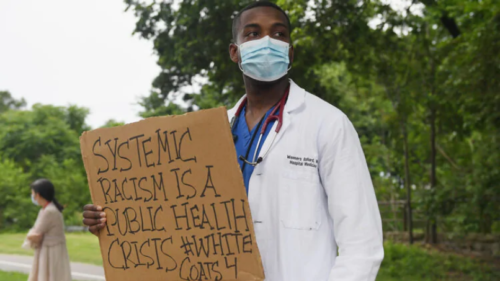Rep. Adam Schiff: It’s time to end racial bias in our health care system
Share
Explore Our Galleries
Breaking News!
Today's news and culture by Black and other reporters in the Black and mainstream media.
Ways to Support ABHM?
OPINION: U.S. Rep. Schiff introduces the Equal Health Care for All Act, a civil rights approach to bringing equity to health care
By Rep. Adam Schiff, thegrio.com
The past few months have seen an outpouring of demands for change and an end to structural and systemic racism that has been emblematic of our nation for far too long. But even as we work collectively on issues like police brutality and income inequality, we can’t turn our attention away from another form of injustice – inequality in health care and patient outcomes.
Dr. Martin Luther King, Jr. once said that, “Of all the forms of inequality, injustice in health care is the most shocking and inhuman because it often results in physical death.” More than fifty years after he spoke those words, discrimination in the form of explicit bias, and unintentional bias, remains a stark reality for millions of Americans who need health care.

Several hundred doctors, nurses and medical professionals come together to protest against police brutality and the death of George Floyd at Barnes-Jewish Hospital on June 5, 2020 in St Louis, Missouri. (Photo by Michael B. Thomas/Getty Images)
It’s well-known that there is persistent and even deadly inequality in health outcomes across racial, ethnic, and other immutable lines. It is driven by a lack of access to affordable and quality care, higher rates of chronic diseases like diabetes or heart disease, nutrition, and much more. The result is that vulnerable groups, and particularly communities of color, like Black Americans and Latinos, experience higher rates of chronic disease, higher risks of transmissible disease like HIV/AIDS, and lower life expectancy.
These structural inequities are tragic and unacceptable on their own, but it is actually worse than that. Study after study has shown that health outcomes for certain populations are linked to unconscious biases held by the providers who care for them.
Read the full article here.
Learn more about current roadblocks in the Black community here.
More Breaking News here.











Comments Are Welcome
Note: We moderate submissions in order to create a space for meaningful dialogue, a space where museum visitors – adults and youth –– can exchange informed, thoughtful, and relevant comments that add value to our exhibits.
Racial slurs, personal attacks, obscenity, profanity, and SHOUTING do not meet the above standard. Such comments are posted in the exhibit Hateful Speech. Commercial promotions, impersonations, and incoherent comments likewise fail to meet our goals, so will not be posted. Submissions longer than 120 words will be shortened.
See our full Comments Policy here.